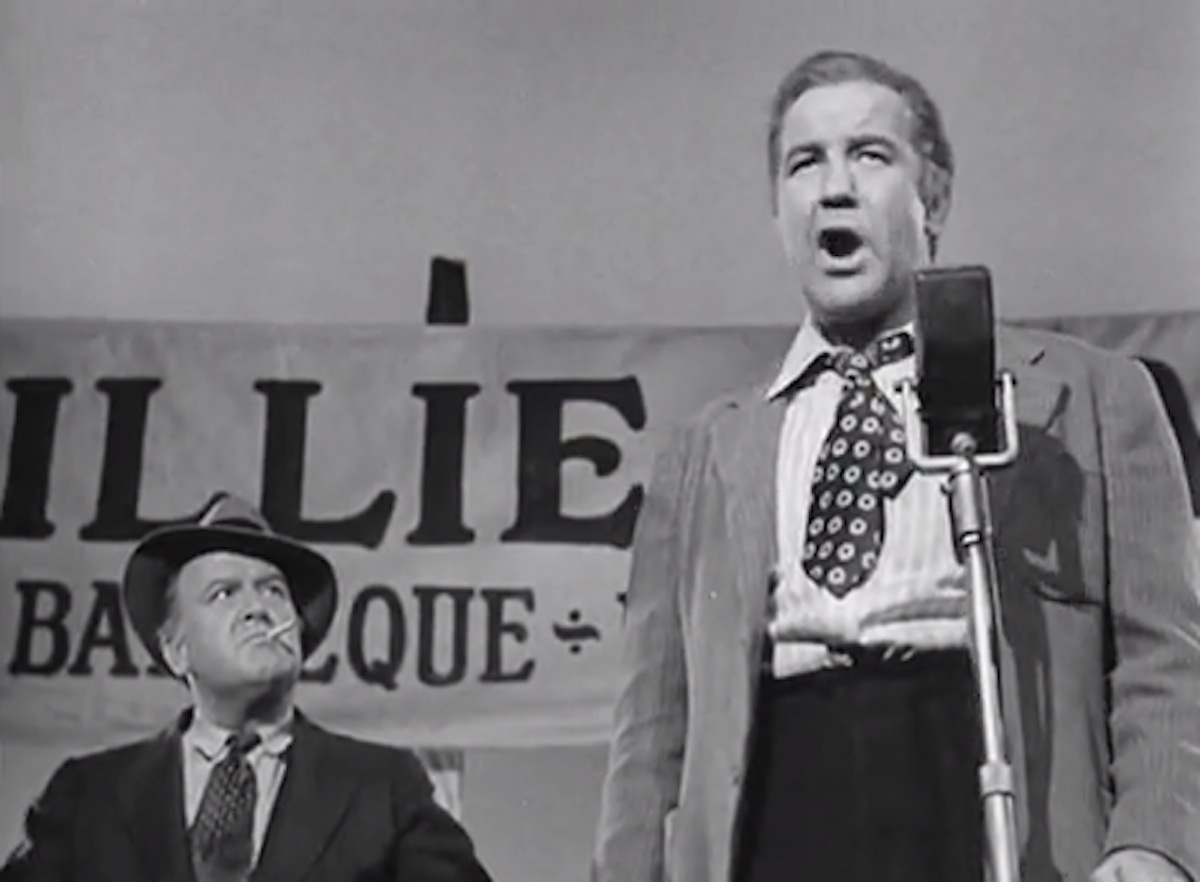“All The King’s Men” (1949) (Twilight Time)
I gave this Best Picture Oscar winner from 1949 some smack
recently, calling it a “blustery mostly-mess” on my blog, which, you
know, is looser and less subject to strict professional standards than other
outlets to which I contribute tend to be. Looking at the excellent new Blu-ray
from Twilight Time helped me take a more measured stance. The problem with the
Robert Rossen movie is that it’s stalled between the more naturalistic approach
I suspect Rossen’s deepest artistic instincts were pulling him to, and a
showier, more sentimental approach for which not only Hollywood can be faulted,
but the Robert Penn Warren source material as well. Anyway. This extras-slim
disc looks damn fine; Burnett Guffey’s cinematography doing a more comfortable
balancing act between a documentary you-are-there feel and more expressive noir
tones. And Broderick Crawford and Mercedes McCambridge bring their respective
unique presences very strongly. —B+
“The Americanization of Emily” (Warner Archive)
Warner Archive Blu-rays are still pretty bare bones,
although now they will port the extras from the standard-def discs with
regularity. So the rule of thumb ought to be, if you liked the standard-def,
you’ll love the high-def. And the upgrade for this movie certainly looks
fabulous, really excellent blacks, a highly impressive range of grays. As
director Arthur Hiller says, in a commentary recorded in the early 2000s, “The
film is in black and white…more of the feeling of reality.” The reality,
for those not familiar with the picture, is James Garner, Julie Andrews and
James Coburn, along with a superb studio supporting cast, sparring cynically in
World War II London to Paddy Chayefsky’s mordant tune. Pretty damn daring for a
1964 picture. While Hiller’s never been a particularly visually trenchant
director, he keeps things moving, and the settings, and the people, are always
worth looking at. But this is still most crucial for Garner, Andrews, and Paddy
fanatics. For whom this will serve as a good library copy. —B+
“Anchorman 2” (Paramount)
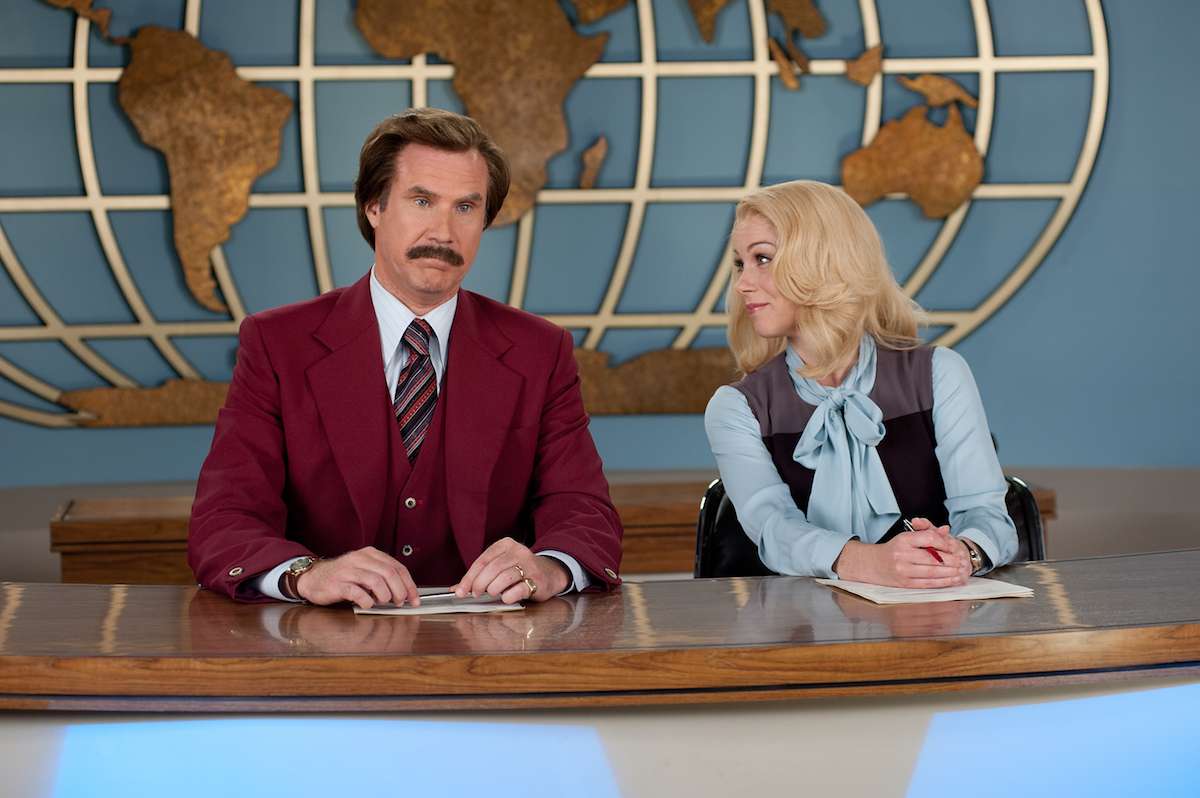
Paramount may be almost harrowingly hit-and-miss with its
treatment of catalog classics (see my thoughts on the two new Howard Hawks
discs below; on the other hand, the “Samson and Delilah” issue was
tops, or close), but when the studio has got filmmakers enthusiastic about the
Blu-ray format on board, the resulting discs can be pretty innovative to say
the least. This disc, for instance, offers three different cuts of 2013’s
relentlessly funny, celeb-cameo clotted, and not entirely toothless slapstick
media satire, one of which is almost two-and-a-half-hours long. Whew. As gag
cornucopias go it’s a bit of an endurance test but that’s actually one of the
things I found most appealing about it. Its look is the bright shiny thing one
almost subliminally associates with wide-release DCP comedies these days. Live
with it. That aside, I enjoyed it more than I thought I would. Docked a notch
for perpetuating the myth that cameo participant Kanye West has an actual sense
of humor. —A
“Bring Me The Head Of Alfredo Garcia” (Twilight Time)
Sam Peckinpah’s 1974 near-gonzo “Sierra Madre”
riff, with Warren Oates seemingly having the time of his life playing the
director’s stand in, hasn’t benefited from a full restoration here; this solid
high-def transfer of the movie was made from materials that were not the most
pristine. So the quality is what you’d get from, say, an excellent projection
of a print that’s been on a ten-city tour. More than watchable, for certain. It
retains the older supplemental material from the MGM standard def release and
adds a new commentary between TT co-honcho Nick Redman (who was also on the
older commentary) and longtime Peckinpah cohort Garner Simmons, who alternates
between admiration for Peckinpah’s genius and a tone that suggests that merely
remembering the horrors that Peckinpah put him and other crew members through
is a revisit to Hell’s despite. No-holds-barred stuff. —A-
“The Counselor” (20th Century Fox)
Speaking of innovations in Blu-ray and Blu-ray supplements.
The news here is two-fold. This movie sparked a lot of controversy on release:
was the collab between Literary Guy screenwriter Cormac McCarthy and master
technician and/or visionary Ridley Scott a New Kind Of Profound Thriller or
Some Unholy Risible Alliance Of B-Movie Brutality And Highfalutin Posturing? I
myself thought it pretty damn ballsy, if silly in part; the longer cut ups both
quotients, and looks spectacular. What’s really interesting though is the
three-and-a-half hour version of the movie, which features a Scott commentary
(detailed and tech-wonky as usual, but with a special emphasis on theme) and
interpolates different making-of mini documentaries into the movie itself. A
form of home theater hypertext, if you will, and pretty damn fascinating. And
also the sort of thing that only really works in Blu-ray. And wait’ll you see
what happens to poor Brad Pitt in the unrated cut. Oy. —A
“Crimes and Misdemeanors” (Twilight Time)

Any claim Woody Allen has on being a great, rather than
mostly very good and largely spotty, filmmaker will have to be based more on
this than on, say, “Manhattan” or “Stardust Memories.” (“Annie
Hall” ought to figure prominently in the argument too, of course.) The key
is the structural complexity and how the film’s themes of guilt and faith
refract against each other as a result. It’s a real feat, particularly in both
the writing and editing departments, and Allen pulls it off more deftly here
than he does in pretty much any other picture he’s made. So yes, it is worth owning. And the Blu-ray
looks very good, albeit a little on the pinkish side. Or yellow-getting-pink in the sunlit
scenes. But really beautiful for the
most part. Damn thing was shot by Sven Nykvist, of course it looks great.
One-time NYC landmarks such as Tavern on the Green are seen to nostalgic effect
if that’s what you’re into. Daryl Hannah and Victor Argo make surprising
appearances. And I guess you could call Dylan Farrow turning up in a shot in
the wedding scene finale surprising too. The movie is full of terrific
performances, from Alan Alda to Mia Farrow to especially Martin Landau—the
acting’s so good throughout that Allen ends up being the movie’s weakest
performer by default. No extras. —A
“Dukes of September” (429 Records)
Readers of Donald Fagen’s “Eminent Hipsters,”
which contains what many consider an overly dyspeptic diary of his tour with
this combo, which he frontlined with Michael McDonald and Boz Scaggs, may well
be curious as to how the Steely Dan frontman comported himself in this context.
This is a good way to find out. I didn’t consider Fagen’s piece dyspeptic so
much as bracingly honest and not without self-criticism, and this “Great
Performances” episode was shot both near the end of Fagen’s travails and
for a knowledgeable and respectable Lincoln Center house. Which is my way of
saying that what we see and hear here is not miserable at all. It’s a
well-shot, kind of conventionally conceived and edited, document of three white
rock stars of higher-than-average talent, taste, and intelligence giving their
level best to some R&B tunes both well-known and obscure (Teddy Pendergrass’s
“Love TKO” is one of the niftier surprises) as well as their own
catalogs, backed by a killer band. There’s some goofy stuff too (their
revised-for-the-occasion “Sweet Soul Music” lyrics), but if the
encore of Buddy Miles’ “Them Changes” is some kind of piss-take, I
don’t know how. Excellent sound, which justifies the Blu-ray. No extras. —B
“El Dorado“, “Hatari!” (Paramount)
Glug, and, alternately, bleaugh. Two of Howard Hawks’ more
interesting latter-day efforts get electronically desecrated for
high-definition in edge-enhanced Blu-rays that succeed in neither representing
the movies as they ought to appear or of upticking them to some kind of
perverse big-box store standard. And I love “Hatari!” so much that I can
watch it in any manifestation, so am stuck with this and will be happy whenever
I watch it, but why, oh lord, why? The more problematic “El Dorado,”
which begins promising an interesting Robert Mitchum/John Wayne dynamic before
devolving into a hesitant gloss on the great “Rio Bravo” will prove
more resistible for me I suppose. “Hatari!” has zip in terms of
extras, while “El Dorado” has plenty, left over from the standard-def
edition, including a Richard Schickel commentary in which the critic observes, “Charlene
Holt is obviously an attractive woman.” I prefer the stuff featuring
recently departed Paramount honcho and all around good guy A.C. Lyles. I wonder if he could have done
something about these lousy discs had he still been around. —B-
“Equus” (Twilight Time)
According to the Wikipedia entry on this movie, a
little-celebrated 1977 Sidney Lumet number, fans of the stage play on which it
was based were unhappy with its realistic depiction of horses and stuff, cause
it deprived the work of its use-your-imagination/magic-of-theater aspect. What.
Ever. I only remember it being received as a pretty pro-forma obligatory
adaptation of an Important Theater Piece. It’s a bit more interesting than
that. Richard Burton is a little on the overstated side here but gets off some
convincing gravitas here and there. It’s also interesting to see just what a
heavy presence Peter Firth had even in his youth. After using some overtly
theatrical flourishes in his opening, Lumet reverts to what I call his “British”
style, which can also be seen in the likes of “The Offense:” a
relatively realistic visual dankness, good maintenance of parametric framings
even in moving camera shots, almost always with a relatively weak or diffuse
light source in the frame. Oswald Morris shot it, and did so well, although the
“Reflections In A Golden Eye”-redolent tint in a climactic hayloft
scene is a mistake. I guess. It all looks really good on this Twilight Time
disc. I forgot this is the movie in which Jenny Agutter pulls a gender reverse
Travis Bickle on Peter Firth’s character and drags him to a skin flick. If you
want to keep your horses safe, don’t do that sort of thing, is the lesson of
Peter Shaffer’s play. I guess. —B
“The Freshman” (1925) (Criterion)
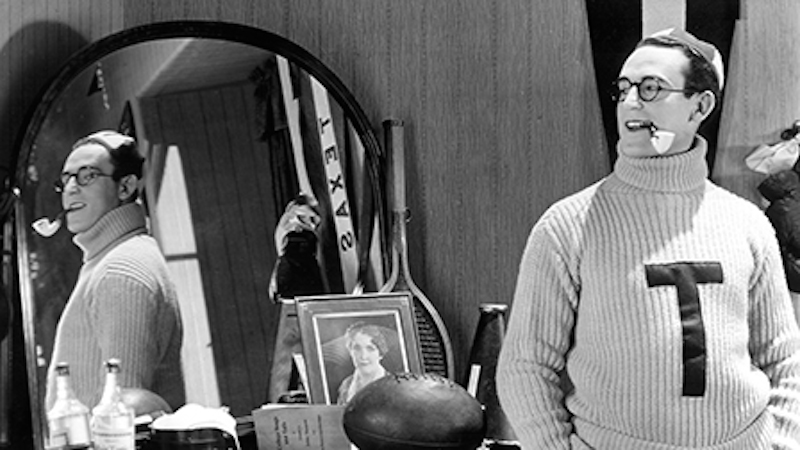
Harold Lloyd’s 1925 slapstick delight isn’t quite as
jaw-dropping in the stunts department as 1923’s “Safety Last,” which
was released on Criterion last year. But it’s still a fun romp, and this
restoration, transferred in progressive high def, not interlaced as “Safety Last”
was (the shortfall with interlaced scan is that there’s “combing”
sometimes visible, which doesn’t happen with a more solid progressive scan),
makes it look like a fresh print, giving the amiable and innovative comedy
stylings a really fresh feel. The audio is terrific too, giving real depth to
the Carl Davis orchestral score. The voluminous extras include a
Leonard-Maltin-hosted commentary from a previous edition, featuring Lloyd
experts Richard Bann and Richard Correll. There’s an engaging video
conversation between Correll and silent film historian Kevin Brownlow, who knew
Lloyd, and three vintage Lloyd shorts, one of which, “The Marathon”
has a really irritating blackface component but another of which, “High
and Dizzy” has some hair-raising pre-“Safety Last” building-ledge-walking
gags. Overall a terrific package. —A+
“The Great Beauty” (Criterion)
As a Paolo Sorrentino skeptic at best, I was quite taken
with the overall watchability of this lengthy sumptuous film, widely hailed as
a 21st-Century gloss on Fellini’s “La Dolce Vita.” I’m
dazzled by its visual component, which is gorgeously captured on the Blu-ray,
but a little nonplussed by the actual content. One is supposed to be appalled
by the decadent rooftop party at the movie’s opening, but honestly, I’ve seen
worse, or “worse.” And I saw it, like 30 years ago. At Area. Or
Danceteria. I forget exactly which. Maybe the people whose jaws got dropped by
the tattooed burlesque type dancing within a glass enclosure ought to get out
more. Who am I to say. Anyway, as the movie goes on, it paints its aging Roman
protagonists as failed urbanites who wanna go back to being provincials, and
concludes that today’s public intellectuals aren’t even real intellectuals.
Heck, I don’t need Paolo Sorrentino to tell me the second part. And if I wanna
go back to being a provincial myself (and more and more often I do!) I know
which way to go. Anyhow, nifty disc. In the extras, academic and salonist
Antonio Monda makes an apt inquisitor of Sorrentino. A deleted scene features
an aged filmmaker declaring, “De
Oliveira is older than me.” Again, a really beautiful looking disc! —A-
“The Hidden Fortress” (Criterion)
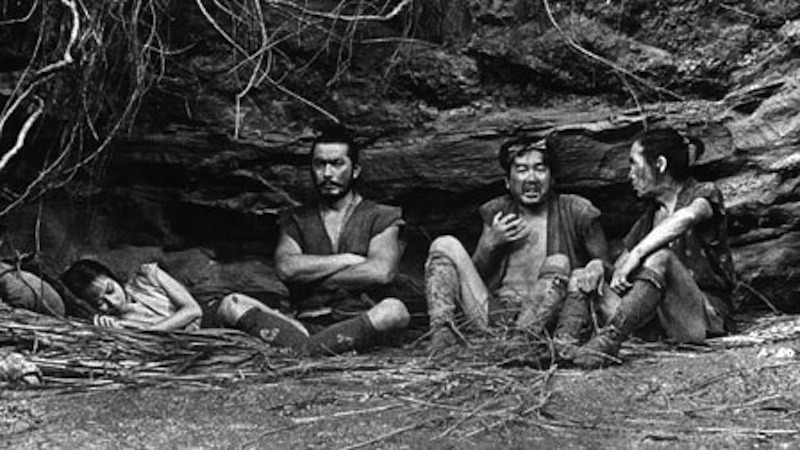
Hokey smokes. Longtime fans of Akira Kurosawa are, in my
experience, invariably delighted by this 1958 comic adventure. It is, among
other things, among the least tortured of his films. The antic story came after
a long run of bleak visions—”I Live In Fear,” “Throne of Blood,”
“The Lower Depths” —and also afforded Kurosawa his first opportunity
to work in widescreen, and his delight in the vistas he can put together shows
from the very first frames. (And yes, this movie was a major inspiration for
George Lucas’ 1977 release “Star Wars,” there, I mentioned it, are
you happy?) Anyway, this Blu-ray upgrade from one of the first 120 of Criterion’s
standard def DVDs looks great in a new 2K restoration, features the good
Stephen Prince commentary from that edition, has got an uncompressed mono
soundtrack that’s super vivid and also the three channel “Perspecta”
quasi surround track that was on the original Japanese theatrical release,
which I like because I’m into Quad and stuff, and more. An essential beauty —A+
“L’Immortelle” (Kino Lorber)
Kino Lorber’s domestic issuing of Redemption’s swell series
of films by awesomely adept French lit perv Alain Robbe-Grillet continues
apace. Let us pause for a moment and praise providence or whatever. Back in the
days you were lucky if you could see this stuff on the fly at a rep
house—Robbe-Grillet never really caught on with American cinephiles the way
Resnais did, or maybe there were just business and rights issues, who can
say—and now here’s near the entire ARG filmo in nifty high def versions
accessible at nearly the push of a button. It really is a partially delightful
world we are approaching the end of, no? In any event, this fairly
scintillating thriller-like narrative, in which Jean Doniol-Valcroze bids fair
to become the recipient of the world’s longest you-know-what tease from
gorgeous enigmatic Françoise Brion in exotic Istanbul is so far the best
looking of the ARG Blus. Amazing rich blacks, flawless whites, and fabulous
detail. This was his debut feature as a
director, made in 1963, and has the most in common with “Last Year At
Marienbad,” and is quite a trip. Should also be seen by anybody who was
intrigued by that Vanity Fair piece about Robbe-Grillet’s widow the
octogenarian dominatrix, as she shoots the camera some very disciplinary looks
every now and again. Sole extra is another lengthy interview with the auteur,
who is unfailingly wry and articulate. As always. —A-
“Inside Llewyn Davis” (Sony)
Readers of this site and my blog know that this movie made
me feel all the feelings, so obviously my recommendation is necessarily colored
by my high regard for the movie. Which was shot on 35mm, and may be the last
movie by the Coen brothers to be so lensed. Interestingly, at a press
conference for the movie at the New York Film Festival Joel Coen said words to
the effect that even shot-on-film movies are so heavily manipulated in the
digital domain, which is now the default mode of post-production, that—and I’m
not quoting or paraphrasing here, just spelling out an implication I picked up
from his words—one might as well shoot digitally anyway. I bring this up
because it’s only on the Blu-ray that I felt I was seeing the effects of the
digital treatment on the movie. That is to say, its deliberately wintry look is
so consistent in a particular way that I felt a kind of filtering going on,
which I didn’t notice in theatrical screenings. Something in the color grading,
perhaps. I found this discovery “interesting” rather than upsetting,
and also found the image on the Blu-ray overall to be very handsome and noise
free. There’s nothing special in the extras. —A
“King of Comedy” (Fox)

This is not the “visual powerhouse” kind of movie
that a lot of Martin Scorsese’s prior pictures were—you know, “Raging Bull“—and
in fact at times has a nearly drab tone. This is all entirely deliberate and
apt. And the Blu-ray image is solid, detailed, and comprehensive, relative to
what the movie’s offering. And the movie is essential. The extras are pretty
remarkable. There’s a video record of the Tribeca Film Festival screening last
spring with Scorsese, Robert De Niro and Jerry Lewis that is kind of
remarkable, especially for Lewis, who is riveting when he’s refusing to take
things seriously and surprisingly on-target when he’s choosing to actually
engage. And then there are almost 40 minutes of deleted scenes. Which were, I
think, deleted for very good reason but are incredibly fascinating from an
academic/critical perspective. For heaven’s sake, Rita lets herself get picked
up by the mugging restaurant client played by Chuck Low! Yep, you’ve got to see
it to believe it. Also: Rupert Pupkin tells a Reagan joke, which is really
almost too ballsy when you think about it. —A+
“The Past” (Sony)
Asghar Farhadi’s intense, convoluted followup to his
international arthouse breakthrough “A Separation” gets a
conscientious Blu-ray presentation that highlights the movie’s somber, mentholated
color palette. More than with most movies, the view seems to be mediated by
glass, and this is likely deliberate. In Farhadi’s commentary—is in Farsi, with
English subtitles, which alternate with the movie’s own English subs to
interesting effect—he discusses glass, and characters separated by panes, as a
visual/thematic leitmotif. So there. Most of the commentary otherwise is of the
“This scene was really hard” variety, with this notable variation
over a dinner scene: “This is an Iranian dish that is a favorite in Iran.
Everybody likes it. It’s traditional Iranian food. The actors wanted to get to
the scene quickly so they could eat the food. But we did so many takes of this
scene that I’m sure they’ll never have this food again.”—A
“Performance” (Warner Archive)
This once absolutely reviled picture, shot at the “Sympathy
For The Devil” end of the ‘60s but not released until the post-Altamont onset
of the ‘70s, has grown in reputation the extent that one critic (a committed
Godardist, admittedly) considers in the Greatest British Film Ever. And it is
pretty amazing, and still genuinely disquieting. Hence, this Blu-ray is apt,
and while it’s not a stem-to-stern restoration—the opening credits are still
windowboxed, for one thing—it looks and sounds as decadently trippy and mordant
as it is meant to. That said, there’s the matter of the soundtrack, and this
version has the U.S. version, which compromises the movie by having an American
actor dub in the voice of Johnny Shannon, who plays a key gangster in the
movie. Shannon’s accent rendered his speech practically incoherent to American
ears…but it is authentic. This can’t be condemned as an “illegitimate”
version—it is the U.S. release soundtrack—but it will be an issue for some. The
extras are the same as the standard def. I’ve always been entertained by the
super cheesy pre-EPK type short film advertising the movie’s forward-thinking-ness
in the music soundtrack production
department with great bits of narration such as “Jagger makes great use of a unique device called a Moog
Synthesizer to write and then record his music. …the synthesizer is an
electronic machine capable of reproducing any sound in the world.” Sounds
awesome! —B+
“Persona” (Criterion)
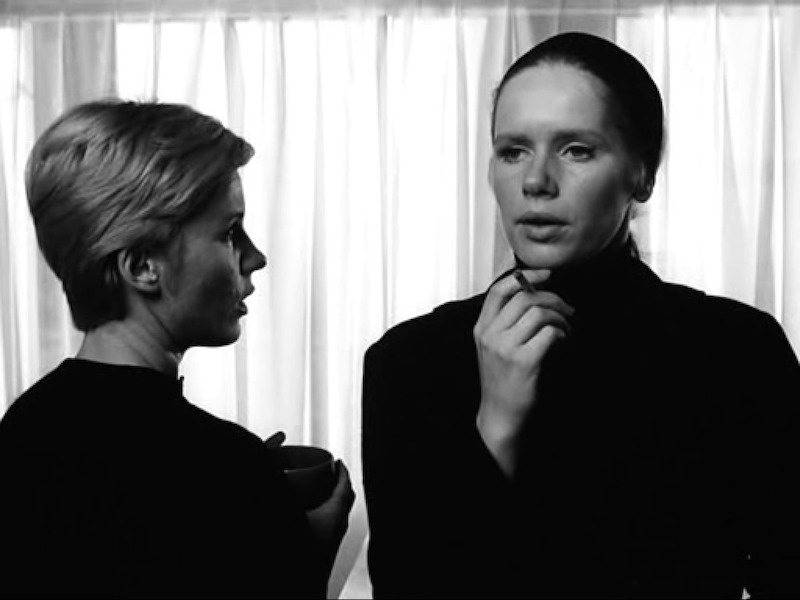
Criterion goes to town with an elaborate, exciting
presentation of Ingmar Bergman’s galvanizing, still-problematic 1966
psychodrama. The 83 minute movie feels epic, unwieldy, because the frames
themselves seem to be in so much pain. Bergman grapples with trauma over the
state of the world, over personal relationships, and even over his own state in
the increasingly quarrelsome world of film culture in the foment of the 1960s,
that there is not a moment here that is not fraught. The 2K digital restoration
is beautiful: bet you never thought you’d be able to see freckles on Nordic
vision Bibi Andersson, but here they are. Bergman scholar Peter Cowie presents
a searching prologue, costar Liv Ullman and Bergman devotee Paul Schrader
contribute insight in interviews, and the recent documentary “Liv &
Ingmar” is also included as a supplement. Another great film, beautifully
presented, with a master class on it as well—a Criterion landmark presentation!
—A+
“The Swimmer” (Grindhouse)
This was once a Sony DVD, but it sure as hell did not look
as good as this. Typically for the incredibly conscientious folk at Grindhouse,
this 1968 studio oddity—a John Cheever adaptation that’s a horror movie that
doesn’t know it’s a horror movie, if that’s not giving away too much—gets the
4K scan treatment, and the rolling hills of the sterile Connecticut monied
vales have never looked so greenly forbidding. Shirtless Burt Lancaster trades
winks with Kim Hunter, Marge Champion, Janice Rule and even Joan Rivers but
strikes out bad with teen Janet Landgard…anyway, if you’ve never seen it, trust
our founder Roger Ebert’s blurb on the front cover: “brilliant and
disturbing.” Also brilliant: the accompanying, correspondence and
text-heavy making of doc that’s one of the movie’s voluminous extras, which
also include liner notes from Stuart Gordon. What a movie. What a package. —A+
“White Light/White Heat” (Universal Music Group)
Mark E. Smith, frontman for The Fall, once said in an
interview, “I’m a ‘White Light/White Heat’ person.” That sounds like
the articulation of an ethos, and it is one. Understand who will, as they say.
Anyway, I am too. I’ve been listening to the second Velvet Underground album, recorded in 1967,
for over 40 years, sometimes over headphones even. And I thought maybe if I
could ever hear through the sludge that resulted from a too-in-the-red
recording (the engineer here was Verve house man Val Valentin, who would be
similarly challenged by the volume of The Tony Williams Lifetime a couple year
hence), the secrets of the universe would reveal themselves. In any event, the
sludge itself was pretty damn revelatory. The CD remaster of the “45th
Anniversary Edition” impressed me sufficiently that an audio-only Blu-ray
seemed worth checking out. And it is—this has the most detail of any version of
the album I’ve heard. “Lady Godiva’s Operation” is definitively
creepy, you can hear the beautifully sensitive detailing of the arrangement on “Here
She Comes Now,” and “Sister Ray” actually now features a rocking
rhythm section as opposed to the suggestion of one. That said, this is hardly
an ideal presentation. Of the three lossless formats offered here, the Dolby is
not what is advertised, which kind of doesn’t matter much as the LPCM and DTS
versions are just dandy. It presents only the stereo mix—the punchier mono
offered on the recent CD version would have been nice. And the whole package
overall has a parsimonious air, particularly since it retails for nearly forty
damn bucks. That said. It’s the best I’ve heard this record. Which is not
nothing. —A-

